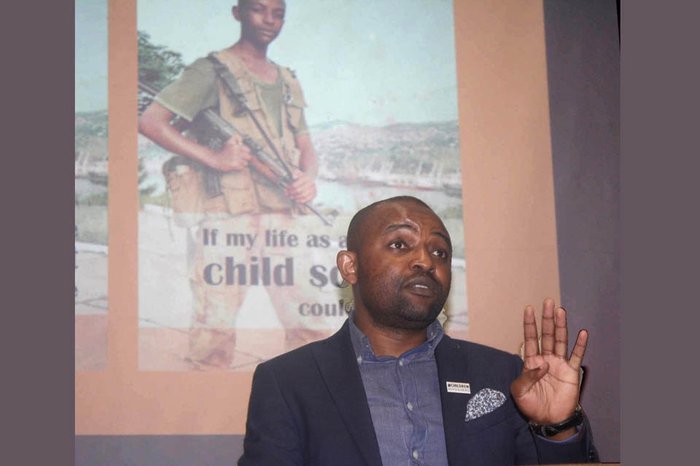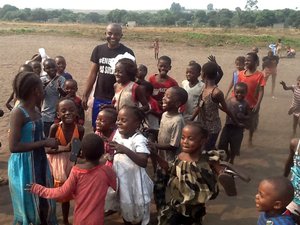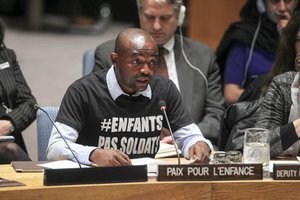
Destroyed villages, war, escape, and persecution: the situation in Congo has been dramatic for years. More and more children are drawn as soldiers into the war, as in the case of Junior Nzita. Today, he courageously tries to liberate children from this plight.
It is estimated that, during the decades of civil war in Congo, approximately 30 000 child soldiers were misused by different rebel groups and also by government troops. Junior Nzita comes from Kiondo, a small town on the eastern border in the province North Kivu. This is where around three quarters of the child soldiers are still recruited today.
Junior Nzita is 12 years old when, in November 1996, he and his fellow class mates are kidnapped from their boarding school in Kionda by the Alliance of Democratic Forces for the Liberation of Congo (AFDL). For ten years, he is mercilessly subjected to this command structure, until he is demobilised in 2006 in the course of a programme carried out by UNICEF and the Congolese government authority CONADUR. Between these two events lie uncountable examples of atrocity and mistreatment in the army, a lack of sleep and food, a 3000 kilometre long march straight through the country to Kinshasa, and participation in the war in Angola, from which not even one in ten of the 3800 child soldiers returned.
These events have badly traumatised him. For a long time, he was not able to sleep for longer than two hours. He struggled hard and managed to complete his Higher School Certificate and his training as a social worker. Since then, he has been campaigning for the global condemnation of mobilising child soldiers, for their rights, their protection and for non-violence.

In 2010/2011 in Kinshasa, he founded the organisation "Paix pour l'enfance" (PPE). PPE takes care of former child soldiers living in Kinshasa as war orphans and street children, and offers them the opportunity to attend school or do an agricultural training. In the meanwhile, this includes 140 children and youths (55% girls) as well as 107 war widows. They grow their own food on the land that belongs to PPE.

Within the framework of the UN campaign "Children not Soldiers", since 2012 Junior Nzita has supported several campaigns in Africa and Europe which draw attention to the problem of child soldiers. As a voluntary UN ambassador, he held a powerful speech in front of the UN Security Council in which he appealed for a childhood without military service. In addition, he has participated in several film projects about the fate of child soldiers and has helped to develop an app with the University of Geneva, which demands the demobilisation of underage soldiers.
His book "„If my life as a child soldier could be told", which has since been translated into several languages, offers the most detailed account of his experiences during the war. All proceeds from the sale of the book go to his organisation "Paix pour l'enfance" and help to cover a large part of the running costs. Not everyone in Congo is pleased by this commitment. Nzita had to leave his country for reasons of safety after he was threatened. What remains is his deep conviction that no child should become a soldier. Nowhere.